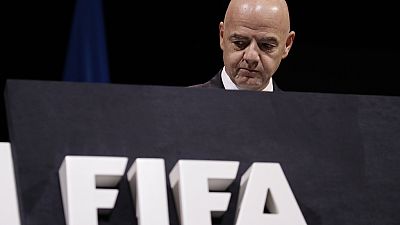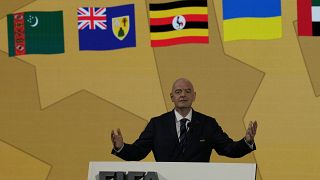Football
FIFA on Wednesday decided to end decades of football tradition by ordering a review of its policy which currently prevents national league matches from being played in other countries.
Fans are likely to object to their team's home games being moved thousands of miles away, although it has become customary for professional sports leagues in the United States to hold games in Europe that help them grow their brand and fan base.
The United States and Saudi Arabia are expected to be prime hosts to attract competitive matches from top European countries, and FIFA recently agreed to withdraw from an ongoing lawsuit in New York brought by promoter Relevent to challenge the veto on the organization of competitive league matches.
FIFA President Gianni Infantino did not respond to questions and did not hold a news conference in Bangkok, where the soccer body's council met on Wednesday and decided to create a group work to examine so-called “out of territory” matches.
So far, Italian, Spanish and French authorities have been able to travel to countries such as Saudi Arabia, China and Israel, but only on the occasion of their National Super Cup, a largely ceremonial match between the holders of the title of the previous season in the national championship and in the cup.
FIFA's new policy is expected to appeal to the growing number of international owners of European clubs, including the wave of American investors in the English Premier League, Italian Serie A and French Ligue 1, as well as state-backed teams such as Manchester City, owned by Abu Dhabi, Paris Saint-Germain, owned by Qatar, and Newcastle, owned by Saudi Arabia.
"It's not part of our current plans, really not," Richard Masters, chief executive of the Premier League, said at a press conference last month when asked if it was possible to do so. organize matches abroad in light of the Relevant trial.
FIFA is creating a group of 10 to 15 people representing football stakeholders, who will be responsible for giving their opinion in the coming months on changing the rules relating to out-of-territory matches.
The rules were last amended in 2014 and require the consent of the FIFA member federation and the host confederation, as well as the team member federation, for out-of-territory club matches.
Since then, attempts to stage European league matches abroad, including FC Barcelona's trip to Miami in 2019, have been blocked, with US promoters seeking to offer fans more than just exhibition matches pre-season in which the best club teams in the world would participate.
In 2018, Infantino opposed the Spanish league's international ambitions, stating that he "would rather see a big MLS game in the United States than La Liga in the United States".
FIFA has asked its yet-to-be-named working group to look into the issue of fairness and provide advance notice to fans who may not be able to attend a match at home or outside the national territory.
Other factors considered by the FIFA working group include "respect for the recognized structure of international football" and potential disruption to fans, teams and leagues in the country hosting out-of-territory matches.
England and Germany are home to some of the most enthusiastic and committed supporters, whose objections to the Super League plan in April 2021 contributed to its failure. The project was pushed by the legendary clubs Real Madrid, FC Barcelona and Juventus, and supported by the American owners of Arsenal, Liverpool and Manchester United.
Spanish Super Cup matches sent to Saudi Arabia are currently under criminal investigation.














Go to video
Al Ahly & Sundowns to clash in CAF Champions League semi-finals
Go to video
CAF fines its president's club $100,000
Go to video
Nigerian Football Federation guilty of negligence in footballer's death
Go to video
Gabonese international Aaron Boupendza dies in China
Go to video
Luis Enrique salutes 'best squad in the world' as PSG advances in Champions League
Go to video
Gianni Infantino visited Philadelphia in his tour of the 11 host cities of the FIFA club world cup